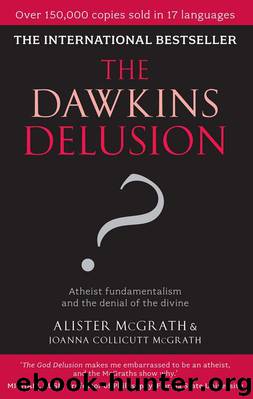The Dawkins Delusion?: Atheist fundamentalism and the denial of the divine by McGrath Alister & Collicutt McGrath Joanna

Author:McGrath, Alister & Collicutt McGrath, Joanna [McGrath, Alister]
Language: eng
Format: azw3
Publisher: SPCK
Published: 2007-02-15T16:00:00+00:00
Belief in God and religion
How are belief in God and religion related? Dawkins fails to make this critical distinction, seeing ‘religion’ and ‘belief in God’ as little more than two sides of the same coin. This inadequate approach does not even begin to deal with the problem of non-theistic religion, an issue which is dismissed with little more than a curt, soon forgotten, acknowledgement.
The God Delusion tends to limit its engagement with religion to demonstrating that its ideas are ridiculous or pernicious, violating the integrity of the human mind or contaminating the purity of the human heart. Yet this emphasis on the ideas and rituals leads, as we have seen, to a somewhat restricted account of religion, which fails to do justice to its many levels of meaning. Any account or description of religion would also have to include at the very least knowledge, experience, group affiliation, motivation and ethical consequences.18
Dawkins wants to offer a Darwinian explanation of religion. So is he accounting for belief in God? Or for religiosity? Or both? There are many who believe passionately in God, but eschew ‘religious’ behaviour – evangelicals represent a case in point. Again, it is possible to have ‘religious’ attitudes, without any attending belief in God – Buddhism is a case in point. Many individuals have a reverential attitude towards nature which is not ultimately theistic, but could still reasonably be termed ‘religious’.
The fundamental argument here is that ‘religion’ is (though he does not use this term) an epiphenomenon – a random by-product of something else, that has selective advantage. But in order to pursue this line with any rigour it is vital to define what aspect of religion is being considered. Dawkins refers to ‘beliefs’, and by this he appears to mean something corresponding to creedal statements, such as ‘belief in the existence of the Trinity’. This is a simplistic approach to an area that is much more complex than might appear on superficial inspection.
The type of belief that might usefully be subjected to his sort of Darwinian explanation are what are sometimes referred to as ‘hot cognitions’, such as ‘God likes me’ or ‘I am a sinner’, which express felt ‘meaning’, rather than propositional statements such as ‘God is good’ or ‘Jesus’ mother was a virgin’. The psychological processing systems involved in these two different types of statements are quite different in their characteristics, and likely to fulfil distinct psychological functions.19 The compelling nature of religious faith almost certainly relates to processing by what psychologists John Teasdale and Philip Barnard refer to as the ‘implicational’ subsystem rather than the ‘propositional’ subsystem. This is an emerging field, which requires careful analysis, and does not seem to fit easily into Dawkins’ exclusively propositional account of religious belief that focuses on dogmas.
Dogmas are not only propositional; they arise in a social context, and fulfil a social function. For instance Christian dogmas define agreed community ‘belief statements’, which emerged after an extended period of reflection on the fundamental resources and experiences of the Christian community.
Download
This site does not store any files on its server. We only index and link to content provided by other sites. Please contact the content providers to delete copyright contents if any and email us, we'll remove relevant links or contents immediately.
The Secret Power of Speaking God's Word by Joyce Meyer(3184)
Signature in the Cell: DNA and the Evidence for Intelligent Design by Stephen C. Meyer(3132)
Real Sex by Lauren F. Winner(3016)
The Holy Spirit by Billy Graham(2944)
The Gnostic Gospels by Pagels Elaine(2527)
Jesus by Paul Johnson(2352)
Devil, The by Almond Philip C(2326)
23:27 by H. L. Roberts(2248)
The Nativity by Geza Vermes(2227)
Chosen by God by R. C. Sproul(2161)
All Things New by John Eldredge(2160)
Angels of God: The Bible, the Church and the Heavenly Hosts by Mike Aquilina(1964)
The Return of the Gods by Erich von Daniken(1943)
Angels by Billy Graham(1922)
Knowing God by J.I. Packer(1855)
Jesus of Nazareth by Joseph Ratzinger(1811)
The Gnostic Gospel of St. Thomas by Tau Malachi(1794)
Evidence of the Afterlife by Jeffrey Long(1786)
How To Be Born Again by Billy Graham(1778)
